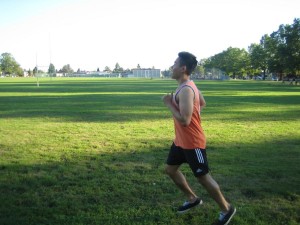The calf muscles are located in the rear part of the lower leg called the gastrocnemius. The calf muscles are used in almost any activity such as walking, climbing stairs, running and jumping. Always remember that these muscles can become sore at certain times for various reasons while involved in physical activity and at rest. It is best to consult a doctor if it is difficult to determine the source of the pain and if the first aid measures could not alleviate the discomfort.
Muscle strains
A muscle strain is considered as one of the usual reasons for the development of sore calves. The muscle strains develop once the muscle fibers become torn. Overuse without enough recovery time as well as exercising without proper warm up are contributing factors to sore calf muscles.
The individual should stretch out the calves before the exercise routine is started to help prevent muscle strains. The individual should stand with the palms flat against the wall while the feet are shoulder-width apart. He/she should rise up onto his/her toes to loosen up the calf muscles. If you want to learn ways to handle muscle strains, click here.

Swelling
The calf muscles can become sore if the individual is suffering from swelling or edema in the lower legs. If the individual was not aware that he/she suffered a muscle strain, it is vital to consult a doctor regarding the swelling of the calves. The condition can stem from a blood clot or deep vein thrombosis which can be a life-threatening condition.
Lymphedema is another condition in which the calf muscles can swell which eventually leads to soreness and tightness. The condition is often linked with the removal of the lymph nodes in the lower body as a form of treatment for certain types of cancers.
Dehydration
Dehydration can also be considered as a cause of sore calf muscles. The muscle cramping is the tight, involuntary contraction of the muscles which leads to intense pain during the cramp as well as residual soreness once the muscle is relaxed.
When the individual becomes dehydrated, the level of electrolytes in the body becomes imbalanced. Magnesium, calcium and potassium are the electrolytes that manage muscle and nerve function. If the individual does not drink enough water and there is lack of these nutrients in the diet, it can lead to sore calf muscles. The individual should stick with a diet that includes spinach, potatoes, bananas and oranges in order to increase the potassium level.
Management of pain
The treatment for sore calf muscles will depend on the cause of the pain. Overuse injuries that trigger tenderness and minimal swelling of the muscles can be managed with the application of ice, rest and over-the-counter pain medications. The muscle cramps can also be managed with gentle massage to loosen up the tight muscle. The sore calf muscle linked with lymphedema can be managed with compression stocking. If the pain worsens, it is best to consult a doctor for proper treatment.
